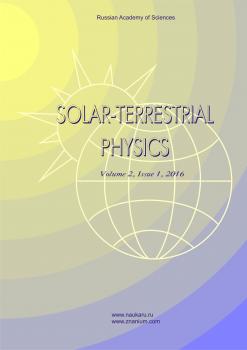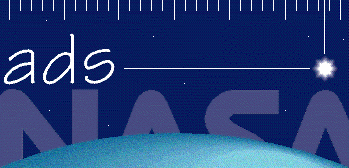Irkutsk, Russian Federation
Sanspot, United States of America
Tuson, United States of America
Tuson, United States of America
Analysis of synoptic data from the Vector Spectromagnetograph (VSM) of the Synoptic Optical Long-term Investigations of the Sun (SOLIS) and the NASA/NSO Spectromagnetograph (SPM) at the NSO/Kitt Peak Vacuum Telescope facility shows that the reversals of solar polar magnetic fields exhibit elements of a stochastic process, which may include the development of specific patterns of emerging magnetic flux, and the asymmetry in activity between Northern and Southern hemispheres. The presence of such irregularities makes the modeling and prediction of polar field reversals extremely hard if possible. In a classical model of solar activity cycle, the unipolar magnetic regions (UMRs) of predominantly following polarity fields are transported polewards due to meridional flows and diffusion. The UMRs gradually cancel out the polar magnetic field of the previous cycle, and rebuild the polar field of opposite polarity setting the stage for the next cycle. We show, however, that this deterministic picture can be easily altered by the developing of a strong center of activity, or by the emergence of an extremely large active region, or by a ‘strategically placed’ coronal hole. We demonstrate that the activity occurring during the current cycle 24 may be the result of this randomness in the evolution of the solar surface magnetic field.
Solar cycle, sunspot activity, magnetic fields, coronal holes
1. Babcock H.W. The topology of the Sun’s magnetic field and the 22-year cycle. The Astrophys. J. 1961, vol. 133, pp. 572-589. DOIhttps://doi.org/10.1086/147060.
2. Balasubramaniam K.S., Pevtsov A.A. Ground-based synoptic instrumentation for solar observations. Proc. SPIE 8148. Solar Physics and Space Weather Instrumentation IV, 814809. 2011. DOIhttps://doi.org/10.1117/12.892824.
3. Baumann I.D. Schmitt D. Schüssler M. Solanki S.K. Evolution of the large-scale magnetic field on the solar surface: A parameter study. Astron. Astrophys. 2004, vol. 426, pp. 1075-1091. DOIhttps://doi.org/10.1051/0004-6361:20048024.
4. Bertello L., Pevtsov A.A., Harvey J.W., Toussiant R.M. Improvements in the determination of ISS CaII K parameters. Solar Phys. 2011, vol. 272. P. 229-242. DOI: 10.1007/ s11207-011-9820-8.
5. Bertello L., Pevtsov A. A., Pietarila A. Signature of differential rotation in Sun-as-a-star Ca II K measurements. The Astrophys. J. 2012, vol. 761. 11. DOI:https://doi.org/10.1088/0004-637X/ 761/1/11.
6. Cameron R. H., Dasi-Espuig M., Jiang J., Isik E., Schmitt D., Schüssler M. Limits to solar cycle predictability: Cross-equatorial flux plumes. Astron. Astrophys. 2013. vol. 557. A141. DOIhttps://doi.org/10.1051/0004-6361/201321981.
7. Dasi-Espuig M., Solanki S.K., Krivova N.A., Cameron R., Peñuela T. Sunspot group tilt angles and the strength of the solar cycle. Astron. Astrophys. 2010, vol. 518, no. A7. DOI:https://doi.org/10.1051/0004-6361/201014301.
8. Dasi-Espuig M., Solank, S.K., Krivova N.A., Cameron R., Peñuela T. Sunspot group tilt angles and the strength of the solar cycle (Corrigendum). Astron. Astrophys. 2013, vol. 56, no. C3. DOI:https://doi.org/10.1051/0004-6361/201014301e.
9. DeVore C.R., Sheeley N.R., Boris J.P., Young T.R., Harvey K.L. Simulations of magnetic-flux transport in solar active regions. Solar Phys. 1985, vol. 102, pp. 41-49. DOI: 10.1007/ BF00154036.
10. Györi L., Baranyi T., Ludmany A. Photospheric data programs at the Debrecen Observatory. Proc. of the Intern. Astron. Union, 6, Symp. S273. 2011. August 2010, pp. 403-407. DOI:https://doi.org/10.1017/S174392131101564X.
11. Ivanov V.G. Joy’s law and its features according to the data of three sunspot catalogs. Geomagnetism and Aeronomy. 2012, vol. 52, no. 8, pp. 999-1004. DOI: 10.1134/ S0016793212080130.
12. Jiang J., Cameron R.H., Schmitt D., Isik E. Modeling solar cycles 15 to 21 using a flux transport dynamo. Astron. Astrophys. 2013, vol. 553, no. A128. DOI:https://doi.org/10.1051/0004-6361/ 201321145.
13. Jones H.P., Duvall T.L., Jr., Harvey J.W., Mahaffey C.T., Schwitters J.D., Simmons J.E. The NASA/NSO spectromagnetograph. Solar Phys. 1992, vol. 139, pp. 211. DOI: 10.1007/ BF00159149.
14. Keller C.U., Harvey J.W., Giampapa M.S. SOLIS: An innovative suite of synoptic instruments. Innova-tive Telescopes and Instrumentation for Solar Astrophysics. Proc. SPIE. 2003, vol. 4853, pp. 194-204. Eds. Stephen L. Keil, Avakyan S.V.
15. Leighton R.B. A Magneto-kinematic model of the solar cycle. Astrophys. J. 1969, vol. 156, pp. 1-26. DOI: 10.1086/ 149943.
16. McClintock B.H., Norton A.A. Recovering Joy’s Law as a function of solar cycle, hemisphere, and longitude. Solar Phys. 2013, vol. 287, pp. 215-227. DOI: 10.1007/ s11207-013-0338-0.
17. Mordvinov A.V., Grigoryev V.M. Erofeev D.V. Evolution of sunspot activity and inversion of the Sun’s polar magnetic field in the current cycle. Adv. Space Research. 2015, vol. 55, pp. 2739-2743.
18. Mordvinov A.V., Yazev S.A. Reversals of the Sun’s polar magnetic fields in relation to activity complexes and coronal holes. Solar Phys. 2014, vol. 289, pp. 1971-1981. DOI: 10.1007/ s11207-013-0456-8.
19. Muñoz-Jaramillo A., et al. The minimum of solar cycle 23: As deep as it could be? The Astrophys. J. 2015, vol. 804, iss. 1, article id. 68, 12 p. DOI:https://doi.org/10.1088/0004-637X/804/1/68.
20. Karachik N.V., Pevtsov A.A., Abramenko V. For-mation of coronal holes on the ashes of active regions. The Astrophys. J. 2010, vol. 714, pp. 1672-1678. DOI:https://doi.org/10.1088/0004-637X/ 714/2/1672.
21. Petrovay K. Solar Cycle Prediction. Living Rev. in Solar Phys. 2010, vol. 7, pp. 6. DOI:https://doi.org/10.12942/lrsp-2010-6.
22. Petrie G.J.D. Evolution of active and polar photospheric magnetic fields during the rise of cycle 24 compared to previous cycles. Solar Phys. 2012, vol. 281, pp. 577-598. DOI:https://doi.org/10.1007/s11207-012-0117-3.
23. Petrie G.J.D. Solar Magnetism in the Polar Regions // Living Reviews in Solar Physics. 2015, vol. 12, pp.5-102. DOI:https://doi.org/10.1007/rsp-2015-5.
24. Petrie G., Ettinger S. Polar field reversals and active region decay. Space Sci. Rev. 2015, vol. 70. DOI: 10.1007/ s11214-015-0189-0.
25. Pevtsov A.A. Transequatorial loops in the solar corona. The Astrophys. J. 2000, vol. 531, pp. 553-560. DOI: 10.1086/ 308467.
26. Pevtsov A.A., Abramenko V. I. Transport of open magnetic flux between solar polar regions. Solar and Stellar Variability: Impact on Earth and Planets. Proc. IAU. 2010, vol. 5, iss. S264. Eds. Kosovichev A., Andrei A., Rozelot J.-P. (Cambridge Univ. Press), pp. 210-212. DOI:https://doi.org/10.1017/S174392 130999264X.
27. Pevtsov A.A., Berger M.A., Nindos A., Norton A.A., van Driel-Gesztelyi L. Magnetic helicity, tilt, and twist. Space Sci. Rev. 2014, vol. 186, pp. 285-324. DOI:https://doi.org/10.1007/s11214-014-0082-2.
28. Schrijver C.J., De Rosa M.L., Title A.M. What is missing from our under-standing of long-term solar and heliospheric activity? The Astrophys. J. 2002, vol. 577, pp. 1006-1012. DOI:https://doi.org/10.1086/342247.
29. Sun X., Hoeksema J. T., Liu Y., Zhao J. On polar magnetic field reversal and surface flux transport during solar cycle 24. The Astrophys. J. 2015, vol. 798, p. 114. DOI:https://doi.org/10.1088/0004-637X/798/2/114.
30. Tlatov A.G., Dormidontov D.V., Kirpichev R.V., Pashchenko M.P., Shramko A.D., Peshcherov V.S., Grigoryev V.M., Demidov M.L., Svidskii P.M. Study of some characteristics of large-scale solar magnetic fields during the global field polarity reversal according to observations at the Telescope-Magnetograph of Kislovodsk Observatory. Geomagnetism and Aeronomy. 2015, vol. 55, no. 7, pp. 969-975.
31. Wang Y.-M., Lean J., Sheeley N.R., Jr. Role of a variable meridional flow in the secular evolution of the Sun’s polar fields and open flux. The Astrophys. J. 2002, vol. 577, pp. L53-L57. DOI:https://doi.org/10.1086/344196.
32. Wang Y.M., Nash A.G., Sheeley N.R. Magnetic flux transport on the Sun. Science. 1989, vol. 245, pp. 712-718. DOI:https://doi.org/10.1126/science.245.4919.712.
33. Upton L., Hathaway D.H. Predicting the Sun’s polar magnetic fields with a surface flux transport model. The Astrophys. J. 2014, vol. 780, no. 5. DOI:https://doi.org/10.1088/0004-637X/780/1/5.
34. Yeates A.R., Baker D., van Driel-Gesztelyi L. Source of a prominent poleward surge during solar cycle 24. Solar Phys. 2015, vol. 290, pp. 3189-3201. DOI:https://doi.org/10.1007/s11207-015-0660-9.
35. Zhao J., Kosovichev A.G., Bogart R.S. Solar meridional flow in the shallow interior during the rising phase of cycle 24. Astrophys. J. 2014, vol. 789, no. L7. DOI:https://doi.org/10.1088/2041-8205/ 789/1/L7.

















